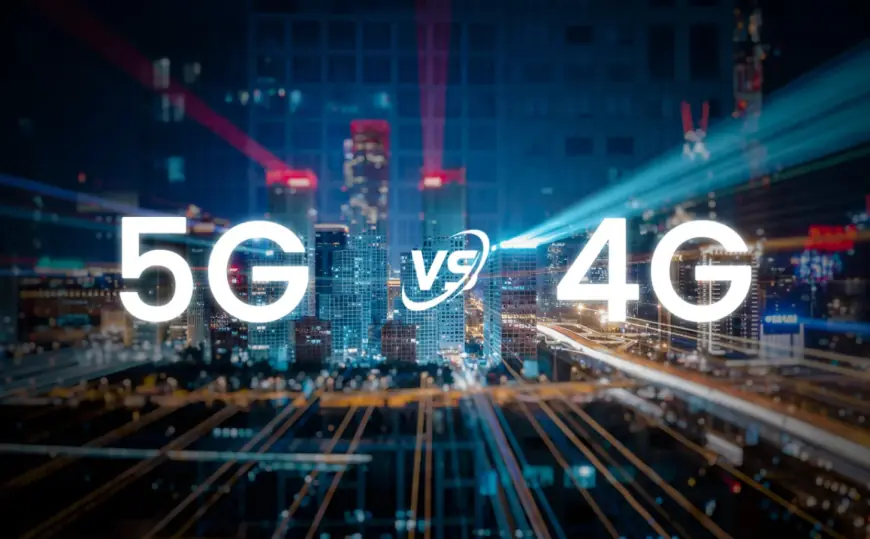5G vs 4G LTE: A Side-by-Side Comparison You Can Understand
Confused about 5G and 4G LTE? Learn the key differences in speed, coverage, reliability, and cost to decide which network works best for your needs in 2025.

5G vs 4G LTE: Which One Fits Your Life Best?
When it comes to mobile internet, there’s no shortage of hype about 5G. It’s promoted as faster, smarter, and the next big step in connectivity. But before you rush to upgrade, it’s worth looking closely at how 5G compares with the tried-and-true 4G LTE that most of us still rely on.
Here’s a clear, side-by-side breakdown of 5G vs 4G LTE so you can choose the right option for your lifestyle, location, and budget.
Speed: Who Wins?
If speed is your top priority, 5G is the clear winner—at least in ideal conditions. 5G can reach over 1 gigabit per second, which is 10–20 times faster than the average LTE speed. That means downloading a high-definition movie could take seconds instead of minutes.
However, speed depends heavily on coverage. In areas with weak 5G signals, LTE may actually perform better because it has stable, consistent speeds. Most LTE networks offer between 20–50 Mbps, which is more than enough for HD streaming, video calls, and most online activities.
5G is faster where it’s strong, but LTE is still reliable almost everywhere.
Coverage: The Reality Check
Coverage is where LTE still dominates. After more than a decade of infrastructure building, LTE is available across cities, suburbs, and rural areas. It’s rare to find a location where LTE doesn’t work.
5G coverage is expanding, but it’s far from complete. While big cities and busy urban areas may have solid coverage, smaller towns, remote areas, and highways often rely on LTE fallback. If you travel frequently—especially to rural or off-grid places—LTE is still your best friend.
LTE wins for widespread availability; 5G is catching up but not there yet.
Reliability and Stability
Fast speeds mean little if your connection drops or fluctuates. LTE has a proven track record of stable performance. Once you’re connected, you can usually count on it to stay connected.
5G’s reliability is improving, but in weaker coverage areas, it can switch back and forth to LTE, which may cause battery drain and speed dips.
LTE offers consistent performance; 5G’s reliability depends heavily on location.
Latency: The Gamer’s Metric
Latency measures how quickly your device sends and receives data. For gamers, streamers, and live video hosts, low latency means smoother experiences.
5G’s latency can be as low as 1–10 milliseconds, which is excellent for competitive gaming, video conferencing, and VR. LTE’s latency averages 30–50 milliseconds, which is still fine for most people but may not feel as instantaneous.
5G is better for real-time online activities.
Device and Cost Considerations
To use 5G, you need a 5G-capable phone, hotspot, or router. Older LTE-only devices won’t connect to 5G networks. Most carriers now include 5G access at no extra charge in plans, but upgrading your device can be a costly step.
LTE works on a wider range of devices, including older models, without any extra requirements.
LTE is budget-friendly and works with most devices; 5G requires new hardware.
Battery Life Factor
One hidden difference is how the two technologies affect battery life. Searching for a 5G signal in areas with weak coverage can drain your device’s battery faster than LTE.
In strong 5G zones, battery life is more comparable, but LTE often lasts longer on a single charge in real-world conditions.
LTE can be more power-efficient, especially outside strong 5G coverage zones.
Which Should You Choose?
You might be better off with 5G if:
-
You live in an area with solid 5G coverage.
-
You regularly download or upload large files.
-
You want the lowest possible latency for gaming or streaming.
-
You like having the latest technology.
You might stick with LTE if:
-
You live in or travel to rural areas often.
-
You want stable, reliable coverage over maximum speed.
-
You don’t want to replace your device yet.
-
You value better battery life in low-signal areas.
That’s why services like Ubifi LTE Internet remain popular—they focus on consistent, high-quality LTE connections that work in more places, from rural homes to RVs on the road.
Advantages Recap
5G Pros:
-
Much faster speeds.
-
Lower latency for gaming/streaming.
-
Can handle more devices at once.
4G LTE Pros:
-
Broader coverage, including rural areas.
-
Reliable, consistent performance.
-
Works on more devices without upgrades.
-
Often better for battery life in low-signal areas.
Conclusion
5G is exciting and will eventually become the new standard. But today, the “best” choice depends on where you are and what you do online. If you have strong 5G coverage and need the speed, go for it. If you want proven reliability almost anywhere you go, LTE is still an excellent—and often smarter—choice.
FAQs About 5G vs 4G LTE
1. Is 5G always faster than LTE?
Not always. In weak coverage areas, LTE can actually be faster and more reliable.
2. Will LTE be phased out soon?
No. LTE will continue operating for many years alongside 5G.
3. Can my LTE phone connect to 5G?
No. You need a 5G-capable device.
4. Is 5G better for gaming?
Yes. 5G has lower latency, making it smoother for online games.
5. Should I upgrade to 5G now?
If you have strong coverage and a 5G device, it can be worth it. If not, LTE is still a great option.
What's Your Reaction?
 Like
0
Like
0
 Dislike
0
Dislike
0
 Love
0
Love
0
 Funny
0
Funny
0
 Angry
0
Angry
0
 Sad
0
Sad
0
 Wow
0
Wow
0















































